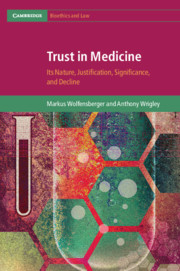Book contents
- Trust in Medicine
- Cambridge Bioethics and Law
- Trust in Medicine
- Copyright page
- Dedication
- Contents
- Figures
- Tables
- Preface
- Acknowledgements
- A Note on Usage
- Part I Introduction
- Part II The Nature of Trust
- 3 A Critical Analysis of Existing Definitions of Trust in Medicine
- 4 Proposing a New Type of Definition
- 5 A Pattern-Based Definition of Trust
- 6 Differentiating Trust from Related Concepts
- 7 Adapting the Definition of Trust to Different Situations
- Part III Justification of Trust
- Part IV Significance of Trust
- Part V The Decline of Trust
- Part VI Perspectives
- References
- Index
- Series page
3 - A Critical Analysis of Existing Definitions of Trust in Medicine
from Part II - The Nature of Trust
Published online by Cambridge University Press: 19 August 2019
- Trust in Medicine
- Cambridge Bioethics and Law
- Trust in Medicine
- Copyright page
- Dedication
- Contents
- Figures
- Tables
- Preface
- Acknowledgements
- A Note on Usage
- Part I Introduction
- Part II The Nature of Trust
- 3 A Critical Analysis of Existing Definitions of Trust in Medicine
- 4 Proposing a New Type of Definition
- 5 A Pattern-Based Definition of Trust
- 6 Differentiating Trust from Related Concepts
- 7 Adapting the Definition of Trust to Different Situations
- Part III Justification of Trust
- Part IV Significance of Trust
- Part V The Decline of Trust
- Part VI Perspectives
- References
- Index
- Series page
Summary
This chapter begins with a list of five conditions the authors believe a comprehensive definition or ‘trust’ must fulfil: (1) it must be internally coherent, i.e. ‘trust’ must be understood by previously well-understood terms, and the definition must not lead to inconsistencies or to anything new that does not strictly fall under the concept being defined. (2) It must be comprehensive, i.e. it must encompass all relevant features of trust. (3) It must be applicable both to individuals and to the institutions these individuals work in. (4) It must be able to differentiate trust from concepts such as confidence or reliance, i.e. it must have ‘discriminatory power’. Finally, (5) it must be able to explain the decline of trust and the value of trust, i.e. it must have ‘explanatory power’. The authors then present a brief overview of different types of definitions with a focus on the definitions used in the context of trust in physicians, namely denotative and analytic definitions, followed by a critical examination of existing definitions of ‘trust’. They conclude that none of the existing definitions meets all conditions required for a genuinely comprehensive definition of trust.
Keywords
- Type
- Chapter
- Information
- Trust in MedicineIts Nature, Justification, Significance, and Decline, pp. 21 - 30Publisher: Cambridge University PressPrint publication year: 2019

